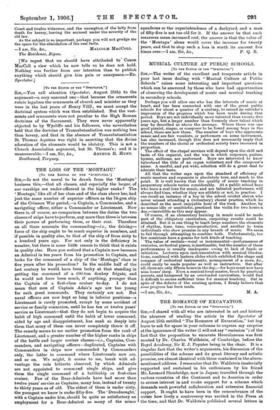MUSICAL CULTURE AT PUBLIC SCHOOLS.
[To THZ EDITOR OP THE SPRCTATOR."1 SIR,—The writer of the excellent and temperate article in your last issue dealing with "Musical Culture at Public Schools" raises some interesting and important questions which can be answered by those who have had opportunities of observing the development of music and musical teaching in secondary schools.
Perhaps you will allow one who has the interests of music at heart, and has been connected with one of the great publio schools for about a quarter of a century, to record an outsider's impression of the progress which has been made during that period. Boys are not individually more talented than twenty-five years ago, but a larger number than formerly show talent which may be described as above the average. Where there was one good pianist, singer, or composer to be found among boys in the school, there are now three. The number of boys who appreciate music and are fair vocalists, or performers on some instrument, has also increased, though this does not necessarily imply that the numbers of the choral or orchestral society have increased in proportion. The effect of the chapel services will depend upon the skill and taste of the organist, and the way in which responses, psalms, hymns, anthems, are performed. Boys are interested to know beforehand the title of an organ voluntary and the composer's name. A careful, and yet wide, selection will do a great deal to educate their taste.
All that the writer says upon the standard of efficiency of music masters and organists is absolutely true, and much to the point. It is well known that the quality of music teaching in preparatory schools varies considerably. At a public school boys who have a real love for music, and are talented performers, will always find time, whether they are athletic or not, to practise. I can recall an instance of a boy in the school cricket eleven who never missed attending a (voluntary) choral practice, which he described as the most enjoyable hour of the week. Another, by no means idle or unathletic, practised the violin for two hours a day,—incredible as this may appear.
Of course, if an elementary training in music could be made part of the obligatory curriculum, surprising results could be attained. But it is one thing to teach large numbers the elements of rhythm, time, tune, voice-production, and another to train individuals who show promise in any branch of music. We seem to fail through attempting to combine both. Unfortunately, too few musicians have a genius for both kinds of teaching.
The value of recitals—vocal or instrumental—performances of oratorios, orchestral pieces, is inestimable, but the number of these performances is usually inadequate owing to lack of funds or initiative. Lectures upon instrumentation with musical illustra- tions, combined with lantern slides which exhibited the shape and compass of orchestral instruments, arrangement of a score, &c., could easily be made popular as well as instructive. But after all, there are only fifteen hours in the day,—for boys must now have nine hours' sleep. Even a musical head-master, beset by practical parents, and hampered by an overloaded curriculum, would find it difficult to secure sufficient time for musical teaching. But in spite of the defects of the existing system, I firmly believe that some progress has been made.


































 Previous page
Previous page